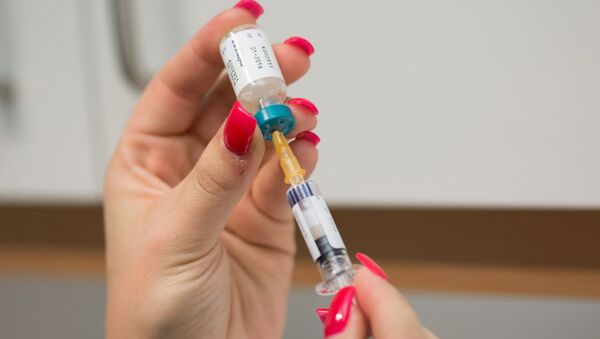Scientific and research centres across the world are racing against the clock to get a preventive vaccine against COVID, with some having already started animal trials. However, the push to create a coronavirus vaccine has raised numerous questions with regard to its efficiency, safety, affordability, and whether or not it will be obligatory, which has added to an already-heated debate among anti-vaxxers – people opposed to vaccination.
While some of them have rethought their stance as there is still no efficient cure against the highly contagious disease, others have become even more suspicious about the prospects for an anti-COVID-19 vaccination, according to media reports.
'Anti-COVID Vaccination May Boost Anti-Vaxxers' Campaign'
The coronavirus pandemic will make the anti-vaccine movement stronger, deems doctor and anti-vaccine campaigner Sherri Tenpenny, admitting that there'll be also those who will line up for the preventive as they have bought into the fear and believe that this virus is a death sentence, which is not the case, according to her.
"Whenever I talk about vaccines to patients in my office, particularly adults - adults really oppose the concept of mandatory vaccination on them," she says. "I think that a lot of people that are hearing this, from all these stay at home orders and they're hearing it on television, I think that people are saying, wait a minute, I need to have a choice in this. I need to know what's in it. Is it really going to help? We now know there may be as many as 30 different SARS COVID-2, strains of those viruses. I read a clinical study yesterday - they think that maybe this one vaccine might cross react with maybe 10 of those strains."
Neither COVID strains nor the particular immune response to any of them have been thoroughly studied yet, she argues. On the other hand, it has been found that "86 to 87 percent of people who actually contract this infection are either asymptomatic or recover completely," the doctor notes, adding that most of the lethal cases were caused not by the novel coronavirus but co-morbidities.
She recollects that previously there was a similar media fuss during the SARS epidemic in 2002, H5N1 in 2005 and H1N1 in 2009. However, these infections had not proven as dire as they were claimed to be.
According to her, the coronavirus issue could have been deliberately fanned up by the media, which is "the mouthpiece of the pharmaceutical industry". Pharma companies largely benefit from producing and selling vaccines, she notes, citing Bill Gates' current COVID vaccine campaign.
Tenpenny is echoed by Mindy Robinson, an actress and political commentator: "Bill Gates has this delusional idea that we’re all just going to line up and let him tag us with his 'vaccine'," remarks Robinson.
Quickly Developed Vaccine May be Not Safe
Yet another problem is that the rush to bring a new vaccine to the market may eventually backfire on people, the doctor opines: "One of [vaccines] was Pandemrix that they used it for and 2009 for H1N1 and pandemirex showed there were thousands of people who were seriously harmed from that vaccine that they fast tracked and ended up with a condition called narcolepsy," Tenpenny notes.
Pandemrix was developed by GlaxoSmithKline and specifically produced for pandemic 2009 H1N1 influenza. Though an increased risk of narcolepsy was found following vaccination with Pandemrix, the 2014 study by the Centres for Disease Control and Prevention said the use of 2009 H1N1 influenza vaccines did not cause narcolepsy.
Developing a new vaccine in a matter of months could be catastrophic, echoes Erin Elizabeth, an activist who runs a newsletter, Health Nut News. She stresses that she's not "anti-vaccine" and opposes only mandatory vaccination.
"It takes years, often decades to perfect a vaccine, as I am sure most vaccine experts have told you," Elizabeth emphasises, citing Dr. Paul Offit of Chidren's hospital of Philadelphia. "The New York Times and most mainstream media repeat how we must have herd immunity within a matter of months, yet the dilemma is a vaccine cannot be developed that quickly that is safe."
For his part, Dr. Paul Offit explains that were there to be a safe and effective vaccine against SARS-CoV-2, some anti-vaxxers would obviously get it, while some still would not opt for it.
"I think that if you ask anti-vaxxers what they want, they would all say the same thing: 'Make vaccines optional.' For them, it's an issue of choice," he says. "You probably wouldn't hear from them until the vaccine was mandated."
'It's Important to Share Science & Evidence'
While the public isn't always kind to health interventions, it's important to share the science and the evidence and stay away from rhetoric and unhelpful arguments, insists Jason Tetro, science writer and host of the Super Awesome Science Show.
Anti-vaxxers' campaigns related to the COVID-19 pandemic may be successful in two cases, according to the author: "One option is to minimise the impact of the virus such that it can no longer be considered a significant threat that requires a vaccine," he says. "The other is to suggest that the virus has been a ploy to remove human rights and lead to the mandatory requirement of vaccination in order to keep the public safe."
"If the world remembers the impact of these last few months when the vaccine eventually arrives, the anti-vaccine movement will not have much success", he says. "But if we tend to forget as we have done in the past from plagues to influenza pandemics, then the anti-vaccine movement will have greater success much as they have seen with their efforts against measles vaccination. I hope this won’t happen."


